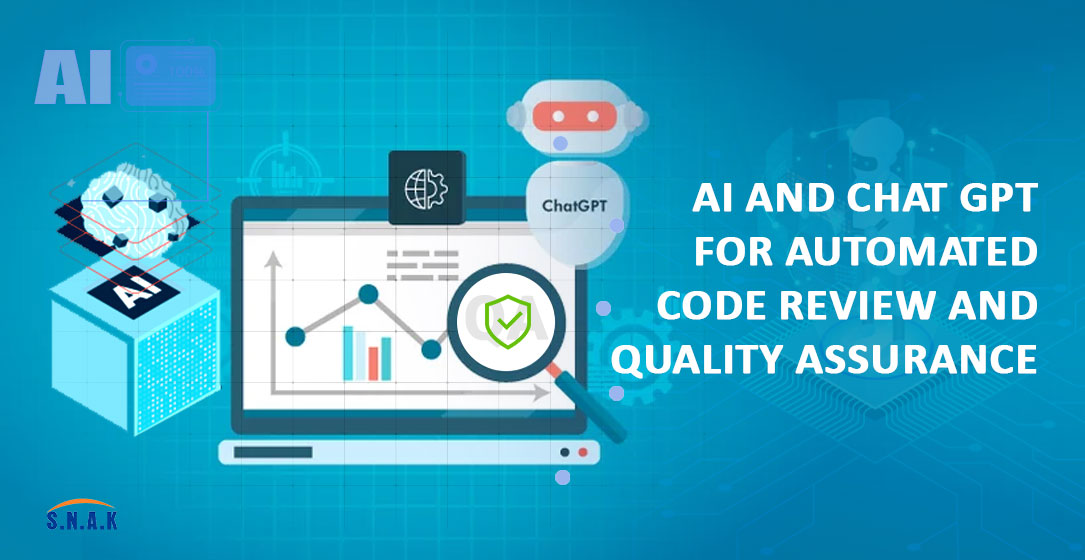April 23, 2024 | SNAK Consultancy
Share on :
Leveraging AI and ChatGPT for Automated Code Review and Quality Assurance

In the fast-paced world of software development, ensuring code quality and adherence to best practices is paramount. However, manual code reviews can be time-consuming and prone to human error. Enter Artificial Intelligence (AI) and ChatGPT, revolutionizing the process of code review and quality assurance by automating repetitive tasks and providing intelligent insights. In this blog, we'll explore how AI and ChatGPT are reshaping the landscape of code review, enhancing efficiency, and improving the overall quality of software projects.
1. Understanding Automated Code Review:
Automated code review involves using AI algorithms to analyze source code and identify issues, such as bugs, security vulnerabilities, and violations of coding standards. By leveraging machine learning models trained on vast repositories of code, these systems can detect patterns and anomalies that human reviewers might overlook. Automated code review tools offer developers real-time feedback, speeding up the development cycle and reducing the risk of introducing defects into the codebase.
2. The Role of AI in Code Review:
AI plays a crucial role in automated code review by applying various techniques, including static code analysis, natural language processing (NLP), and machine learning. Static code analysis involves examining source code without executing it, identifying potential errors or inefficiencies based on predefined rules or heuristics. NLP algorithms enable AI systems to understand and interpret human-readable comments, commit messages, and documentation, providing context for code changes. Machine learning algorithms power predictive code analysis, where the system learns from historical data to anticipate potential issues and recommend improvements.
3. Benefits of Automated Code Review with AI:
Implementing automated code review with AI offers several benefits for software development teams. Firstly, it improves code quality by detecting and addressing issues early in the development process, leading to fewer bugs and vulnerabilities in the final product. Secondly, it enhances developer productivity by automating mundane tasks, allowing team members to focus on more creative and high-impact work. Additionally, automated code review promotes consistency and adherence to coding standards across projects, fostering collaboration and knowledge sharing among team members.
4. Introducing ChatGPT for Code Review Assistance:
ChatGPT, a state-of-the-art language model developed by OpenAI, is making waves in the field of code review assistance. By integrating ChatGPT into code review workflows, developers can interact with the model in natural language, soliciting feedback, asking questions, and receiving suggestions for code improvements. ChatGPT leverages its understanding of programming languages and best practices to provide insightful recommendations, helping developers write cleaner, more maintainable code.
5. Enhancing Collaboration and Learning:
Beyond its technical capabilities, ChatGPT facilitates collaboration and learning within development teams. Developers can engage in conversations with ChatGPT, discussing code changes, sharing knowledge, and seeking advice on complex problems. The model serves as a virtual mentor, guiding less experienced developers and fostering a culture of continuous learning and improvement. Moreover, ChatGPT's ability to communicate in natural language makes it accessible to team members with varying levels of technical expertise, democratizing code review and quality assurance processes.
Questionnaire
Q1: How does AI improve code quality in automated code review?
A1: AI leverages static code analysis and machine learning to detect errors and vulnerabilities early in the development process, leading to higher-quality code.
Q2: What role does ChatGPT play in code review assistance?
A2: ChatGPT provides developers with natural language interactions, offering feedback, suggestions, and guidance for writing cleaner, more maintainable code.
Q3: What are the benefits of automated code review with AI?
A3: Automated code review improves code quality, enhances developer productivity, and promotes consistency in coding standards across projects.
Q4: How does ChatGPT facilitate collaboration and learning within development teams?
A4: ChatGPT serves as a virtual mentor, enabling discussions, knowledge sharing, and guidance for developers at all skill levels.
Q5: What are the future implications of AI and ChatGPT in software development?
A5: AI and ChatGPT are expected to drive further innovation, empowering developers to write better code faster and fostering a culture of continuous improvement in software engineering practices.
Conclusion :
AI and ChatGPT are transforming the way software development teams approach code review and quality assurance. By automating repetitive tasks, providing intelligent insights, and facilitating collaboration, these technologies empower developers to write better code faster and with greater confidence. As the adoption of AI continues to grow, we can expect to see even greater advancements in automated code review, driving innovation and excellence in software engineering.